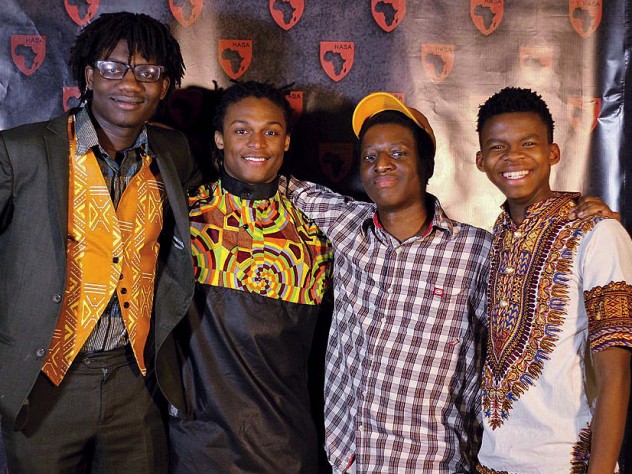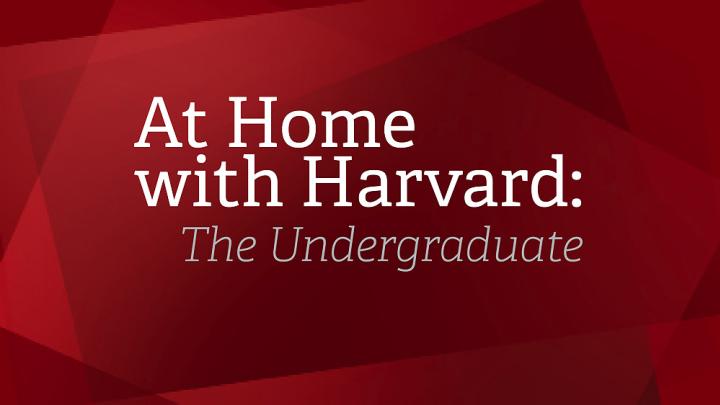This round-up is part of Harvard Magazine’s series “At Home with Harvard,” a guide to what to read, watch, listen to, and do while social distancing. Read the prior pieces, featuring stories about the history of women at Harvard, the climate crisis, and more, here.
The Undergraduate column, written for each issue of Harvard Magazine by one of our two annual Berta Greenwald Ledecky Undergraduate Fellows, is always a favorite among the magazine’s readers and editors. Over the years, our fellows have written about every dimension of life at the College, from student activism to Harvard’s cutthroat exclusivity to making friendships while living off campus. They trust us with their most intimate thoughts and experiences, and their heartfelt essays continue to sing on the page, issue after issue. Here, we’ve curated a selection of Undergraduate essays we think you’ll love.
Certain concerns are perennial among thoughtful undergraduates: Do I belong here? Am I talented enough to objectively judge others’ talent? Am I justified in asserting my own views, wishes, concerns in discussions with others? Am I allowed to exert authority? Ledecky Fellows, unsurprisingly, have wrestled with these topics as well—especially powerfully in Jenny Gathright ’16’s “My Harvard Education” and Lily Scherlis ’18’s “Exclusivity, from the Inside.”
~Jean Martin, Senior Editor

At Harvard African Students Association’s Africa Night (from left): Tom Osborn ’20 of Kenya; Joshua Benjamin ’21, of Phoenix, Arizona (whose ancestors are Angolan but were first brought to Charleston, South Carolina, in the late seventeenth century); Tawanda Mulalu ’20 of Botswana; and Mfundo Radebe ’20 of South Africa
Photograph by Christabel Narh
My culture tells me that the greatest thing you can ever do is to take care of your family. But here, there is the deep, dark thing that happens when you grab a bunch of young, ambitious, and nervous people and stuff them into a place like this. People end up not really caring about one another.
~Tawanda Mulalu
In “Take Care of Each Other,” former Ledecky fellow Tawanda Mulalu ’20, writes wonderfully about what it’s like to be an international student from Botswana, and the community he’s built through the Harvard African Students Association. This is a unique, both joyful and rueful read that I still think about and share with friends. “My culture tells me that the greatest thing you can ever do is to take care of your family,” he writes. “But here, there is the deep, dark thing that happens when you grab a bunch of young, ambitious, and nervous people and stuff them into a place like this. People end up not really caring about one another. The fact that it is so cliché to say this implies the embarrassing plainness of its truth: we’ll pick a work deadline over a friend; we’ll find soft, smart ways of screwing people out of the leadership position that might get us a high-profile job after graduation; we’ll pick who we think is worth talking to based on what they do and the people they hang around with.”

Rejoicing newlyweds Miriam Udel Lambert and David Lambert.
Every year, a small number of Harvard undergraduates get married—a decision sometimes met with shock and disapproval, however natural it might feel to the newlyweds. In “Tying the Knot,” Miriam Udel Lambert ’98 writes about her experience as a married undergraduate and the exclusion, both subtle and overt, that she and her husband felt. She interviews other married students (even one couple that welcomed a child), making this a thorough and diverse look at the married-student experience.
~Marina Bolotnikova, Associate Editor
Now a writer for the New Yorker and the New York Review of Books (among other publications) and editor of The Ballot, which debuted earlier this year, Madeleine Schwartz ’12 was an undergraduate fellow at Harvard Magazine in 2010-11. During that year, she wrote about sharing the academic experience with her mother, who, changing careers, was working toward a law degree in a four-year night program that overlapped exactly with Madeleine’s time at Harvard. “We take our exams during the same busy weeks and experience similar relief at the end of December and May,” Madeleine wrote. “Last spring, we compared notes on cover letters and interviews for our job applications. We will probably graduate within days of each other.” The column is funny and poignant and perceptive, with searching insights into what it means to follow a passion even when it leads to uncertainty. After her internship, Madeleine continued to contribute to the magazine, including this engaging profile of writer Elif Bautman ’99 (whose novel The Idiot follows a Harvard student’s first year of college). She also wrote a piece that instantly became an offbeat favorite of mine—a brisk and delightfully antic appreciation of The Harvard Advocate on its 150th anniversary.
~Lydialyle Gibson, Associate Editor
The commercialization of the Internet has fabricated an ethos of e-commerce so powerful that computer science and finance now share a common battle cry: "Who wants to be a millionaire?"
~Geoffrey Fowler
Before I interviewed Washington Post technology columnist Geoffrey Fowler ’00 for an alumni profile, “Your Tech Relationship Counselor,” I remember being taken aback by this Undergraduate column he wrote, “Why Not.com,” as a senior. It’s hard to write a piece on tech that stands up for six months; this one resonates after 20 years. In it, Fowler describes his reservations about the alluring, fast-growing, volatile world of tech. “[I]n three years, I’ve witnessed a virtual revolution,” he writes. “The commercialization of the Internet has fabricated an ethos of e-commerce so powerful that computer science and finance now share a common battle cry: ‘Who wants to be a millionaire?’” The classmates Fowler interviews—some of the first students to explore the start-up world—provide a perspective about money, risk, and purpose that wouldn’t be so different now. And after designing the original college.harvard.edu and thecrimson.com websites, Fowler has these same decisions to make himself.
~Jacob Sweet, Staff Writer/Editor
Each year, when we interview applicants to join the magazine as undergraduate editorial fellows, we get a sense of the candidates and their writing—but not a deep look into their lives. That often comes when they write. One of the most affecting examples of such sharing came in John La Rue’s gentle but revealing account of what it meant to be a member of Dorm Crew—and to find oneself cleaning a classmate’s bathroom. “It’s always an awkward moment when someone is home,” John wrote. “Somehow, we are not equals when I’m wearing latex gloves.” This insight into the differences of class at an elite institution like the College has attracted readers through the years, and heartfelt reactions. It has also informed our deeper reporting on socioeconomic gaps, especially as the proportion of lower-income and first-generation students enrolled increases—prompting our coverage of academic orientations to such places for brilliant students from under-resourced high schools, and recent scholarship on the challenges they face on campus. John has remained a friend, and it was wonderful to see him back on campus, after years of diverse public-service gigs, during his recent master’s degree studies at the Kennedy School, completed in 2018.
The reality is that, no matter how much Harvard undergraduates complain about strictures and requirements in general, we actually tend to like being told what to do.
~Spencer Lee Lenfield
Spencer Lee Lenfield, an extraordinarily talented student, writer, Rhodes Scholar, and now doctoral candidate in comparative literature at Yale, showed his talent, and interests, from his earliest assignments for the magazine. In an early 2010 column, “January Reading,” he put the new academic calendar into context (“The reality is that, no matter how much Harvard undergraduates complain about strictures and requirements in general, we actually tend to like being told what to do”)—and then demonstrated his independent cast of mind by taking advantage of unstructured time to dive deep into reading and literature: “This sensation of vast bookshelves’-worth of unread masterpieces stretching onward drives most if not all of the students of literature and ideas at Harvard (as elsewhere) to study what they study. This urge combines great pleasure in reading these texts with a strong sense that not doing so is not only an aesthetic loss, but also a failure to educate oneself properly.” In the years since, readers have happily followed Spencer into the cult of Jane Austen, the breadth of comparative world literature, and more. He has remained a friend, a frequent contributor, a wonderful correspondent—and a source of inspiration.
~John S. Rosenberg, Editor
More from “At Home with Harvard”
- Spring Blooms: Your guide to accessing the Arnold Arboretum as the seasons turn in Boston
- Harvard in the Movies: Our favorite stories about Harvardians on screen
- The Literary Life: Our best stories about the practice and study of literature
- Night at the Museum: Our coverage of Harvard’s rich museums and collections
- Nature Walks: Walking, running, and biking in Greater Boston’s green spaces, even while social distancing
- Supporting Local Businesses: Our extensive coverage of local restaurants and retailers, and how you can support them during this time of crisis
- Medical Breakthroughs: Our best stories going deep into the ideas and personalities that will shape the medical care of tomorrow
- Rewriting History: From race and colonization to genetics and paleohistory, our favorite stories about the people reshaping the study of history
- The Climate Crisis: Highlights from our wide-ranging coverage of the environment
- Crimson Sports Illustrated: With 2020 winter sports ending early and the spring collegiate season wiped out almost entirely, we look back at Crimson highlights from past years.
- The Real History of Women at Harvard: Stories covering the admission of women, the Harvard-Radcliffe merger, the rise of women in the faculty ranks, Harvard’s first woman president, and more








